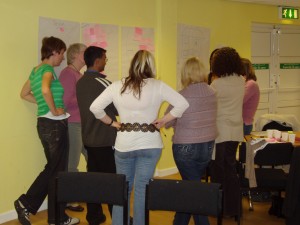Risk & Policy Analysts Limited (RPA), a Norfolk-based consultancy providing advice to clients spanning the chemicals, energy, water, waste and more general environmental sectors around the world, is reaping the business benefits of adopting a more rigorous approach to Facilitation skills.
Providing strategic analysis skills to help decision makers with the development and implementation of sustainable policies, RPA’s activities involve a great deal of ‘engagement work’ – all of which calls for facilitation skills. Teresa Fenn, a Technical Director with RPA, commented: “Although we hadn’t had any formal training in Facilitation skills, we felt that we’d all built up a great deal of experience in this field. However, our work has recently been leading us into areas where we’re becoming increasingly involved in more challenging and complex projects.
“We realised that, to bring today’s more challenging and exacting projects to a successful conclusion, we needed a greater depth of understanding and expertise in facilitation skills,” added Teresa. “So we researched the training options available and asked Tony Mann, of Resource Strategic Change – a company whose expertise is in facilitation and the process of participative change based on its Process Iceberg® methodology – to help us.”
In a training course in 2012, Tony, who is also senior examiner on APMG-International’s Facilitation skills certification scheme, conveyed that methodology to half a dozen or so of RPA’s staff – including Teresa.
“He showed us that we’d been focusing on tasks rather than on process,” Teresa explained. “Once we understood the significance of process within Facilitation it made everything so much clearer and easier. It’s obvious – once you know about it. And then you wonder how you could have approached Facilitation any other way.
RPA has applied this systematic, process-orientated approach to Facilitation in a number of its projects – and has already seen the business benefits that this can produce. Teresa commented: “We’re delighted that we’re benefiting from this approach – and we’d have no hesitation in encouraging others to use the same approach in developing Facilitation skills and expertise.”
The certification scheme in Facilitation skills from APMG-International – the provider of specialist qualifications for knowledge-based workers, including PRINCE2® and ITIL® – aims to teach candidates how to design, apply and use specific processes and tools in order to increase the success of programmes and projects. Based on Tony Mann’s Facilitation methodology, APMG’s scheme offers facilitators the opportunity to be trained, assessed and certified in a similar way to project managers with Foundation and Practitioner qualifications.
Tony Mann believes that RPA’s experience of using Facilitation skills in the context of its consultancy business ably illustrates the application – and the value – of Facilitation in the areas of community engagement, stakeholder engagement, consultation and so on.
“In today’s business world, it’s important to ask questions and seek to engage people. Indeed, there’s a strong moral and financial rationale to involve and engage people who will be affected by big decisions,” he said. “This can be brought about by effective facilitation because, with the appropriate ‘leadership’, teams, groups, stakeholders and even whole communities can be encouraged to be participative.
“Groups, presented with a facilitator who helps design, adjust and apply effective process, will find that meetings and workshops achieve the desired outcomes with speed and efficiency. Effective facilitation enables organizations to be successful in tackling issues that are uncertain. It will help them handle emotions and challenges to people’s core values. It adds real value to organizations and, thereby, to the economy as a whole.”







Leave A Comment
You must be logged in to post a comment.